
One of the reasons BJJ is so popular is the heavy focus on sparring. In most classes, a significant percentage of the training session is dedicated to sparring. A standard 1.5 hour BJJ practice will include 20 mins to 30 mins of sparring also known as rolling.
While seasoned Jiu Jitsu athletes look forward to choking and joint locking their buddies in a full-contact simulated fight, this can be a little intimidating for new students. Let’s breakdown all the things you need to know about Jiu Jitsu sparring.
How Do You Spar In BJJ?
To spar in BJJ, your coach will set a timer (5 or 6 mins) then you will choose a partner, slap hands and fist bump, and then begin trying to submit each other. You can start standing or on the ground. Intensity can range from light 50% to 60% to competition pace 90% +.
During BJJ sparring anything goes as long as you operate within the rules of BJJ. No biting, no manipulating joints, no strikes, no attacking the genitals etc. This is your chance to try and submit your training partners while also defending against their attacks.
BJJ sparring is meant to simulate a fight and is used to pressure test your BJJ. You may have the prettiest armbar when you are drilling it against no ressitance but making that armbar work when someone is fighting hard to stop you is another thing.
This is why BJJ sparring is so important because if you don’t test your techniques against resistance you don’t know how effective they are and you don’t know your true skill level.
BJJ sparring is pretty laid back but there are some unwritten rules that you should follow as some practitioners can become annoyed if you break etiquette.
Before starting a sparring round BJJ athletes use a secret handshake. They will slap hands and then fist bump. If you come from a Judo or wrestling background this may seem a little weird but most BJJ athletes will perform this little routine so don’t leave your partner hanging.
Some upper belts do not like being asked to spar by lower belts. This is a stupid rule but at more traditional schools this tradition is common. I personally will ask anywhere to roll but just beware of your school’s protocol before you do that.
What a lot of new BJJ students get wrong when they start sparring is competing at too high of an intensity. You see this all the time with new white belts the sparring round begins and before you know it they are going at 100%. Within a minute they are bright red and gasping for air.
When you first start sparring you need to take it easy. You do not have the cardio to maintain a high intensity throughout the whole sparring round.
More importantly, you don’t have the skills and technique to spar fast and explosively. If you can barely perform a guard pass while drilling it slowly without resistance how are you going to perform it correctly when sparring at 100%? This really slows many new student’s progression.
Not only do new students not have the technique required to spar at a high intensity they also lack the body awareness. This is why you see so many new BJJ athletes getting injured. They move the wrong way, twist their body incorrectly or don’t react correctly to their partner’s technique and they end up tearing, spraining or ripping something.
If you are driving for the first time you don’t go pedal to the floor and hit the freeway at 120 miles per hour. It is the same with BJJ you need to take it slow until you develop the skills and experience that allow you to spar effectively and safely.
When you are first sparring you need to chill and keep it relaxed. You should stick to around 50% to 60%. You need to focus on learning how to move correctly in the different Jiu Jitsu positions and you should focus on utilizing the techniques you have learned.
This another thing new whitebelts get wrong during sparring. They completely ignore the technique they have learned and just start relying on instincts, performing random movements. This gets them nowhere and prevents them from developing their BJJ skills. If you have never grappled before your instincts are going to be terrible.
Do You Need To Spar Every Class In BJJ?
You do not need to spar every class in BJJ, however, to see consistent progression you should spar at least 2 times a week. How often you spar depends on your training volume if you train 6 days a week, skipping sparring days is fine but if you train twice a week you should spar every session.
Sparring in BJJ is great fun and is a vital training modality. Unfortunately, it is rough on the body and responsible for the vast majority of in BJJ injuries. Due to the injury risks many students are wary about how often they should be sparring.
As sparring is usually included in all BJJ classes new students who don’t want to overdo the sparring will skip classes. This is not necessary it is perfectly fine to go to training and just perform the drilling component of the practice and then leave or sit and watch your training partners spar.
While sparring is needed if you want progress in BJJ you do not need to do it every training session. If you spar at least twice a week that is more than enough to generate consistent progression especially if you are a whitebelt.
Feel free to hit the mats 5 or 6 days a week but only spar 2 or 3 times. This is actually a great way to keep your body fresh and reduce the risk of injury while continuing to learn new Jiu Jitsu techniques.
Your coach may ask why you are skipping sparring but just explain to them that this is what your body can handle and that if you increased your sparring volume you wouldn’t be able to train as much.
